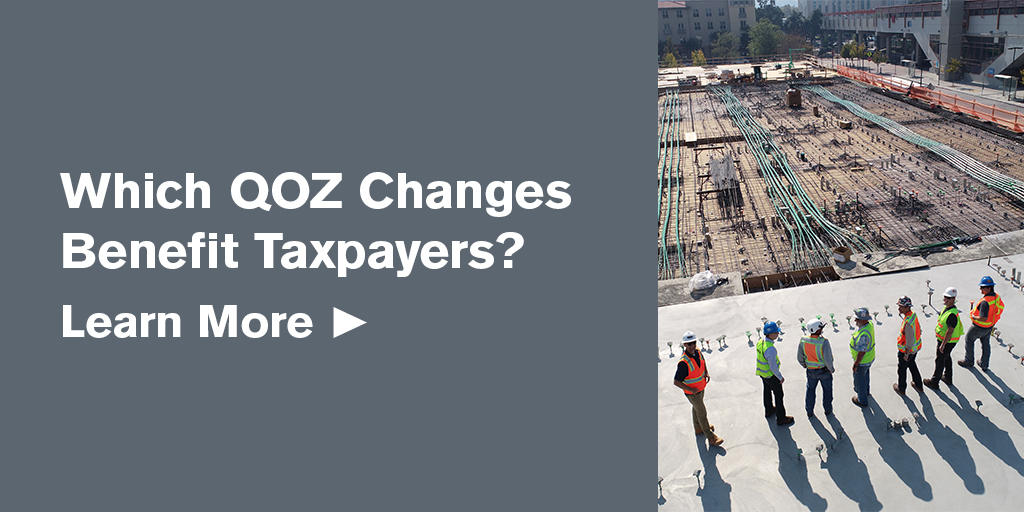Recently, the Treasury Department issued the Final Regulations governing Qualified Opportunity Zones (QOZ) after two sets of Proposed Regulations, oral hearings and other guidance issued by the IRS. Since the QOZ legislation was initially passed in December 2017, the legislation following has been constantly evolving. Many of the modifications included in the Final Regulations are taxpayer friendly.
These final regulations are applicable for tax years beginning after March 13, 2020. However, taxpayers may apply the final regulations for earlier years, if applied in a consistent manner for all tax years. Since the final regulations are generally more favorable to taxpayers, it’s believed most will choose to adopt them.
Section 1231 Gains
The cornerstone benefit of the QOZ legislation is a taxpayer can defer capital gain recognition by investing the gain proceeds in a Qualified Opportunity Fund (QOF). Then, if the taxpayer holds the QOF for at least 10 years, there is no taxation on the appreciation on ultimate disposition.
There have been questions surrounding how these rules applied to sales of trade or business assets (e.g., rental real estate). The sale of trade or business assets triggers Section 1231 gains. Section 1231 gains are treated as capital gains and are thus available for investment in QOFs. Initially, however, the prior proposed regulations provided the investor had to offset Section 1231 losses to determine how much of his/her gain could be invested in a QOF. In addition, the 180-day investment period started on December 31 or the end of the tax year. This created uncertainties and delays in investment.
The final regulations now clarify an investor does not have to offset Section 1231 losses against the Section 1231 gains to determine how much can be invested in a QOF. Additionally, the 180-day investment period now starts from the date of the sale, unless that gain is allocated from a partnership, S corporation or other pass-through entity.
Installment Sales
The final regulations now make it clear that capital gains from installment sales are eligible gains for investment, even if the installment sale occurred prior to 2018 and the enactment of the QOZ legislation.
Eligible Gains from Pass-Through Entities
If a pass-through entity opts not to invest its capital gain into a QOF, the partner or S corporation shareholder can now elect to have its 180-day period start the same time as the pass-through entity’s 180-day period or such period can start upon the original/un-extended due date of the pass-through entity’s tax return.
Substantial Improvement Test
For property to qualify as Qualified Opportunity Zone Business Property (QOZBP), the original use has to commence with the QOF or the QOF has to “substantially improve” the property. The proposed regulations initially stated this test was on an asset-by-asset basis, and there was uncertainty in the context of how one would apply this test in the case of, say, a 10-building apartment complex. Did each of the 10 buildings need to be substantially improved or could you aggregate the buildings to meet the test?
The final regulations allow the fund to aggregate the buildings to meet this test, if the buildings are all in one land parcel or contiguous parcels to the extent each building is operated as part of one or more trades or businesses. In the latter context of contiguous parcels, the QOF must operate the buildings and the buildings must share centralized business elements such as personnel, accounting, IT, legal, etc.
31-Month Working Capital Safe Harbor
There had been much concern over the 31-month working capital safe harbor, as well as additional concerns over the impact of unexpected delays, staged capital contributions, etc. The final regulations now provide for subsequent or overlapping safe harbors with respect to the same tangible property. The Qualified Opportunity Zone Business (QOZB) may apply subsequent 31-month working capital safe harbors for a maximum of 62 months, provided each 31-month period satisfies the requirements.
Exclusion of Gains After Holding Investment For 10 Years
If a taxpayer held a qualifying investment in a QOF for at least 10 years, the taxpayer may elect to exclude the gains and losses from the sales of assets (other than inventory) allocable to the investment. All types of gains and losses can be excluded including Section 1231 gains, depreciation recapture, etc. This election is made annually and applies to all gains and losses in that tax year. To qualify for this benefit, the cash from the sale must be distributed within 90 days of the sale.
Six-Month Cure Period for Defects
Another taxpayer friendly provision in the final regulations lies with a relief provision in the event of a defect. Now, QOZB’s have six months to cure a defect that caused it to fail. During this time, the non-qualifying entity will continue to be treated as a QOZB. This provision can only be used once. If the QOZB fails to qualify at the end of the six-month period, the entity will be treated as a non-qualifying entity for each month it failed to qualify.
Summary
The final regulations contain many other new provisions and changes to the prior proposed regulations. The Treasury Department revised the rules for “original use” in the vacancy area. Additionally, it clarified the treatment of inventory, the tangible property 70% use test and the intangible property 40% use rules. Further, taxpayers can now lease space to a “sin business,” as long as the lease is for less than 5% of the total net rentable square footage, etc. The regulations provide clarification to the lease valuation issues, as well as eligible gains for nonresidents and foreign corporations.
Overall, the final regulations are much more taxpayer friendly and should foster even more investment into Qualified Opportunity Funds.
Contact BPM’s Real Estate team today and find out more about Qualified Opportunity Zones and the available tax benefits.
BPM for Real Estate
BPM’s Real Estate group is skillfully positioned to provide comprehensive “one-stop” accounting, tax and consulting services to those in the real estate industry, such as investors, developers, managers, REITs and family-owned real estate enterprises. Our real estate accountants and consultants understand the regulatory and business challenges facing your industry and are dedicated to staying ahead of the curve to help you navigate a changing market. Our experience enables us to assist you with complex transactions involving formation of real estate funds, acquisitions, development, disposition, investment and management of properties. Devoted professionals are focused on private equity, REITs, family-office, hospitality, construction, development, property management and CRE-Tech.
 Recently, the Treasury Department issued the Final Regulations governing Qualified Opportunity Zones (QOZ) after two sets of Proposed Regulations, oral hearings and other guidance issued by the IRS. Since the QOZ legislation was initially passed in December 2017, the legislation following has been
Recently, the Treasury Department issued the Final Regulations governing Qualified Opportunity Zones (QOZ) after two sets of Proposed Regulations, oral hearings and other guidance issued by the IRS. Since the QOZ legislation was initially passed in December 2017, the legislation following has been 
